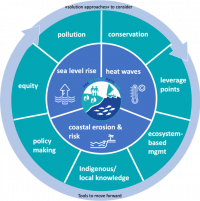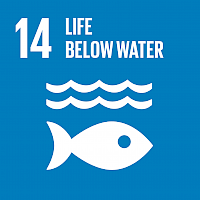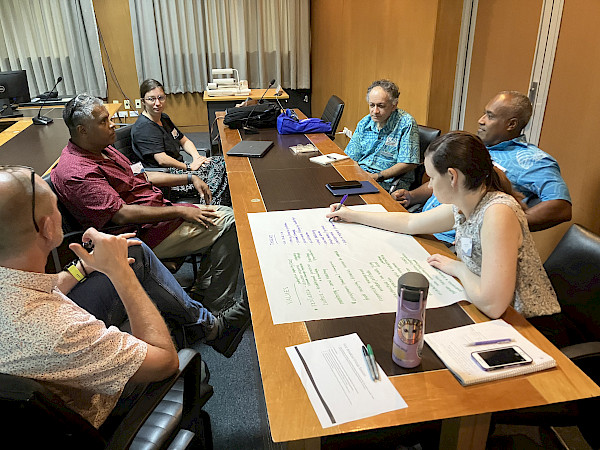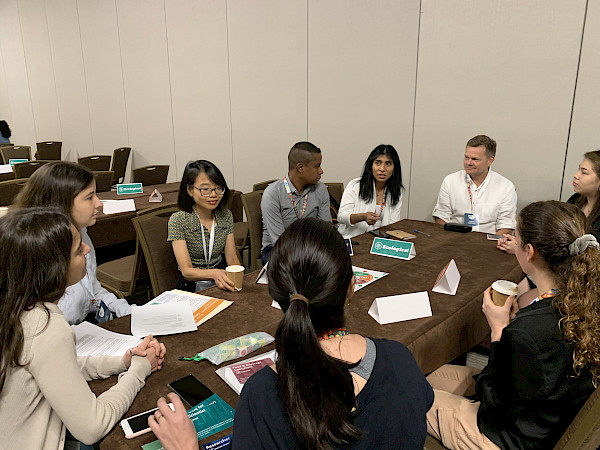Pacific Ocean Pathways Project Science-Society Council Meeting

The Pacific Ocean Pathways project (PACPATH) is a Collaborative Research Action supported by the Belmont Forum to develop sustainability pathways for Sustainable Development Goal 14 (Life Below Water) in Pacific Island Countries. As a transdisciplinary project, our most important imperative is to work closely with stakeholders to design the research program, so that results are relevant to local interests. The PacPath Science-Society Council (SSC) met in April to create consensus about the project scope. The SSC has stakeholder representation from numerous Pacific Island Countries; during the meeting, SSC participants selected Marine Heat Waves, Coastal Erosion, and Sea Level Rise as primary topics. Stakeholders will explore these topics our first workshops in October 2022.
University of the South Pacific Seminar on SDG 14 Indicators for Pacific Island Countries

Heath Kelsey provided a virtual seminar to the faculty and students at the University of the South Pacific on co-developing developing indicators related to Sustainable Development Goal 14 (Life Below Water) in Pacific Island
Countries. The seminar is part of the Pacific Ocean Pathways project (PACPATH). We discussed approaches for co-developing indicators that are relevant to local concerns, and some issues related to applying SDG targets
and indicators at local scales. The SDGs are a global initiative, so targets and indicators may not always be relevant to local issues. Mapping locally-derived and SDG indicators may help streamline efforts to report on SDG progress, while also providing useful information to local management.
Sustainability in the South Pacific



In mid-October, Heath Kelsey and Annie Carew traveled halfway across the globe to facilitate workshops in Nouméa, New Caledonia. This workshop brought together scientists and local managers from across New Caledonia and Fiji to discuss regional priorities. There was a focus on potential management actions in the face of climate change; marine temperature changes impact fisheries and food security, while intensifying storms and sea level rise contribute to coastal erosion that threatens communities. We look forward to continuing these discussions as part of our ongoing PACPATH project through the Belmont Forum.
New partnership in the South Pacific
As part of the PACPATH project, IAN participated in a variety of seminars and workshops this year. These include:
- University of the South Pacific Seminar on SDG 14 Indicators for Pacific Island Countries
- Pacific Ocean Pathways Project Science-Society Council Meeting
- Initial PACPATH workshop in Nouméa, New Caledonia
Second PACPATH workshop in Suva, Fiji

Last month, Annie Carew and Heath Kelsey traveled to Suva, the capital of Fiji, to facilitate the second workshop for the PACPATH project. This project brings together scientists and researchers from Europe, the U.S., and the South Pacific to define and examine the issues facing coastal communities in New Caledonia and Fiji. The first workshop in October focused on New Caledonia, while the second workshop focused on the issues facing Fiji. Workshop participants included government officials, researchers, traditional village leaders, and students. After three days of thorough discussion sessions in Suva, some workshop participants traveled up the coast to a writing retreat, where we had the unique opportunity to visit villages and a reef that is home to breeding dolphins. The PACPATH project is continuing work on New Caledonia and Fiji report cards, coming soon!
Sustainability Research and Innovation Congress in Panama

In the last week of June 2023, Alexandra Fries, Vanessa Vargas-Nguyen, and Bill Dennison attended the 2023 Sustainability Research and Innovation Congress in Panama City, Panama. They presented on several UMCES projects including the Belmont Forum-funded Pacific Ocean Pathways in Support of Sustainable Development (PacPathways) and Coastal Ocean Assessment for Sustainability and Transformation (COAST Card) projects. IAN supported Xin Zhang and Kevin Jackson from Appalachian Lab in playing the Sustainable Agriculture Matrix (SAM) version of the report card game, Get the Grade. IAN also hosted an additional Get the Grade session and a Science Communication Workshop. The Congress was a huge success and it was great to be in-person making connections with old partners and new collaborators.

